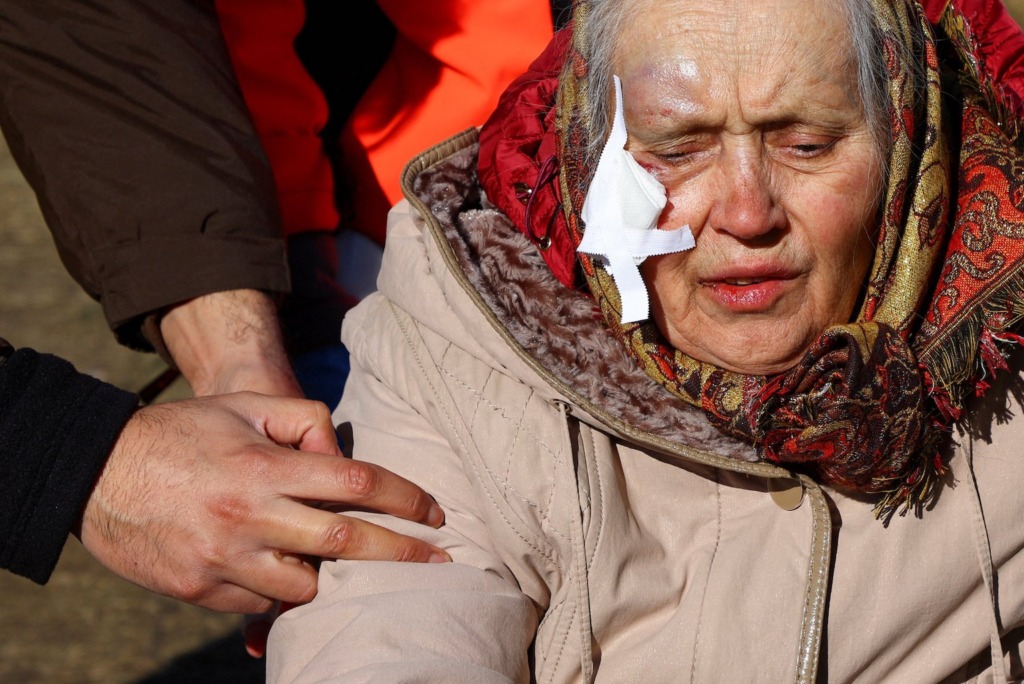Nearly 3 million people have been forced to flee Ukraine in the wake of Russia’s Feb. 24 invasion of that nation, prompting the United Nations to declare the mass exodus the largest refugee crisis in Europe since the end of World War II.
Most Ukrainians have fled westward to neighboring nations — mostly to Poland — where they have found a haven from the bombings, combat, shelling and destruction.
In Poland, the refugees have mostly been assisted by Catholic groups, individual parishes and ordinary citizens willing and actively helping the displaced.
“I consider it my human duty to help our neighbors. … They simply need support. They have left everything they had, their whole life is packed into one suitcase,” said Dorota Pierscieniewska, a 50-year-old resident of Zabki, a suburb of Warsaw.
Pierscieniewska made the comments in an interview conducted via email by the Catholic Standard, newspaper of the Archdiocese of Washington.
Poland so far has accepted 1.3 million refugees from Ukraine. Warsaw alone took in 200,000 refugees — about 10% of its current population — in less than two weeks. Other countries with large numbers of refugees include Romania, Slovakia, Hungary and Moldova.
Pierscieniewska and her best friend, Ukrainian-born Liliia Bilozir, have coordinated outreach efforts in their small town of 30,000 residents.
Those fleeing to Poland, Pierscieniewska said, “need real help, such as housing, food, clothing, hygiene products and medical care.”
The medical needs of these displaced Ukrainians are sometimes overlooked. Support agencies on the ground have reported that frostbite, diarrhea and fainting are the most common afflictions affecting them, and doctors are scrambling to treat those and other conditions. There also are refugees dealing with chronic illness.
“Some of them are sick, without medication, without a medical history that they did not have time to take with them,” Pierscieniewska said. “Doctors, who declare their willingness to help, often do so somewhat blindly. There are also people who have interrupted rehabilitation (ongoing medical care), and without it their health will deteriorate.”
In addition to organized outreach, many Poles such as Pierscieniewska have taken it upon themselves to assist in any way they can. About 95% of Poles said they want their country to accept and help the Ukrainian refugees, according to a survey conducted by Rzeczpospolita, a national newspaper in Poland. Pierscieniewska said there already is a large Ukrainian population living in Poland, many married to Polish citizens.
“They are our neighbors, colleagues from work, doctors, beauticians,” she said.
Pierscieniewska, who works in a bank and is a member of Divine Mercy Parish in Zabki, added: “The thought that I could find myself in this kind of situation doesn’t let me sleep well.”
“When I talk to my friends or to the clients I serve in the bank, I get the impression that most Poles think the same way. It doesn’t surprise me at all, because we also have had similar experiences, for example from the period of martial law,” she said. “I want to show them (the Ukrainian refugees) — not tell them — but show them that they are not alone. That they can count on us.”
Between 1981 and 1983, the then-communist government of Poland instituted martial law, cracking down and punishing those involved in the Solidarity movement or any effort to protest the country’s repressive regime.
“Just like them (the Ukrainian refugees), we are full of different fears,” she said. “The situation we find ourselves in triggered in us undiscovered layers of strength and a willingness to help. I have noticed a strange tendency: the less someone has, the more willing they are to share with others.”
Pierscieniewska said that she has not only collected items for displaced Ukrainians, but has opened her home as well. “We have invited them into our homes. … I, for my part, offered the biggest room in my house, and am helping with all the formalities connected to getting them into schools and looking for jobs for them.”
“It is very important to give these people at least a substitute for normality. We cannot focus exclusively on basic necessities. We also need to think about how to help them overcome barriers, for example language barriers, because they need to find work and their children need to go to school,” she said.
She added that “the first guest in our house” was a dog named Lonia that was rescued from a Ukrainian animal shelter.
Poland — along with Hungary, Romania, Slovakia, Germany, Belgium and other countries — have eased restrictions on animals entering their countries, thus allowing fleeing Ukrainians to bring their companion pets with them.
As she and others continue to help during this time of crisis, Pierscieniewska said she has seen firsthand that the refugees “are terrified.”
“They cannot put this all together in their heads. It is even more difficult to explain this to children,” she said. “There are children who have not managed to take a beloved toy with them or say goodbye to their friends. Above all, these people need to feel safe.”
Szczepanowski is managing editor of the Catholic Standard, newspaper of the Archdiocese of Washington.

